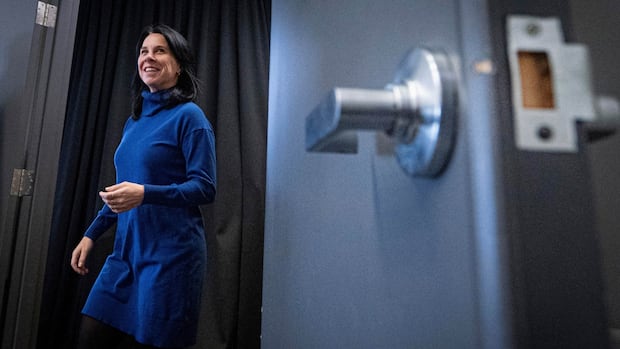WARNING: This story contains graphic details of intimate partner violence.
A judge is now considering what sentence to hand down to a U.S. man convicted in Ottawa of sexually assaulting a young woman, then, after she had left him, embarking on a campaign of criminal harassment against her, her family and her former boyfriend, as well as publishing her intimate images online.
It comes after David Bukoski was found to be absconding justice when he failed to show up in person to Superior Court Justice Adriana Doyle’s judgment back in March, in which she found him guilty of eight of the 13 charges he faced in a case she called “unusual and extraordinary.”
The sentencing phase is proceeding in absentia.
Bukoski’s trial was mammoth, sitting for about 60 days over the course of three years.
He had been given permission to attend virtually from his home in Pennsylvania while the evidence was heard due to his health problems, and even to testify remotely. That permission was revoked ahead of Doyle’s judgment but he showed up online anyway, then failed to return at all after the lunch break.
After the judgment, defence lawyer Mellington Godoy removed himself as counsel, given that Bukoski was found to be absconding and Doyle was signing a warrant for his arrest. Godoy participated in Wednesday’s sentencing as an amicus curiae, or friend of the court.
Bukoski has not been arrested for absconding. Sentencing is expected to be completed ahead of the arrest and extradition proceedings, which could take months.
The Crown is asking for a 10-year prison sentence, among other orders.
Godoy said the range is five years on the low end and 10 on the high end.
‘Stole my teenage years’
The now 25-year-old victim, who cannot be identified due to a routine publication ban protecting her, read a long impact statement in court Wednesday, with her support dog at her side and her family in the gallery behind her.
She met Bukoski online just before she turned 13, when she was “impressionable, naive, and unaware of how vulnerable I truly was.” He was around 18, “had power,” and “knew exactly how to manipulate, how to exploit and how to keep control.”
She said the trauma inflicted on her as a child “stole my teenage years” and continues “to affect my relationships, my health, my trust in people and my ability to feel safe in the world.”
Bukoski sexually assaulted her in the summer of 2017. He took her virginity, forcefully penetrated her “and left me with no concept of what a positive or consensual sexual experience was supposed to feel like,” she told court. As a result, her two subsequent long-term relationships have suffered.
After she left him, Bukoski began his harassment and she contacted police. She told court that “unlike the abuse I had endured in silence since I was 13, this time it wasn’t just directed at me — it spilled into every corner of my life.”
He sent unwanted food deliveries to her home, made threats against her family and targeted their workplaces, and contacted her school and employer. He hacked her online accounts and posted her private information online, including her Social Insurance Number, banking details, school records and her family’s employment information.
He faked his own suicide twice to torment her. After the first suicide hoax he posted her intimate images online and sent an email to her school accusing her of sleeping with teachers in exchange for grades.
‘It was a multi-year trauma’
Then Bukoski called in a fake threat involving her then boyfriend, who was arrested at gunpoint and held in custody for hours. Weeks later, the boyfriend’s car was firebombed in the driveway of his family’s home.
Bukoski was charged in connection to an alleged firebombing plot and attempted murder — and a man testified that he had planted a bomb at Bukoski’s behest — but Bukoski was found not guilty of all those charges. While the court found it probable that Bukoski provided information to the man and may have manipulated him, it ruled the evidence did not meet the standard of proof beyond a reasonable doubt. The man’s testimony contained inconsistencies and there was no corroborating evidence linking Bukoski directly to the attack.
The former boyfriend read his own victim impact statement Wednesday, saying he genuinely thought he was going to die when screaming police arrested him with their guns drawn, that the firebombing robbed him and his family of their sense of safety, and that the emotional scars haven’t faded.
“This wasn’t just a period of stress or discomfort. It was a multi-year trauma. The defendant’s actions hijacked my life. They invaded my home, my relationships, my ability to trust, my sleep, my mental health and my future,” he said.
Everything stopped when Bukoski was arrested in July 2018.
Ending her statement, the assault victim said her mental health, education and career paths and ability to grow her family have all been negatively affected by Bukoski and the trauma he caused.
The Crown is seeking about $30,700 in restitution for her.
Won’t return hacked email account
Court heard Wednesday that Bukoski is continuing to prevent the victim from accessing her Gmail account, which the judge found he had hacked.
While the court waited for the judge to come back to court to address the issue, Crown prosecutor James Cavanagh told the victim in the courtroom that Godoy had asked Bukoski for the password to the account earlier Wednesday, and that Bukoski had replied and declined.
When Doyle returned, Cavanagh asked her to write an endorsement asking Google to consider returning the account to the victim’s control. He said someone from the Crown’s office would pass that on to Google, with whom the office apparently has a “good working relationship,” according to assistant Crown prosecutor Matthew Brown.
“I just don’t like this person to continue to have a tie on my life,” the victim told the judge, when asked for her comments.
Doyle said she would write the endorsement.
Doyle’s sentencing decision is expected in September.






